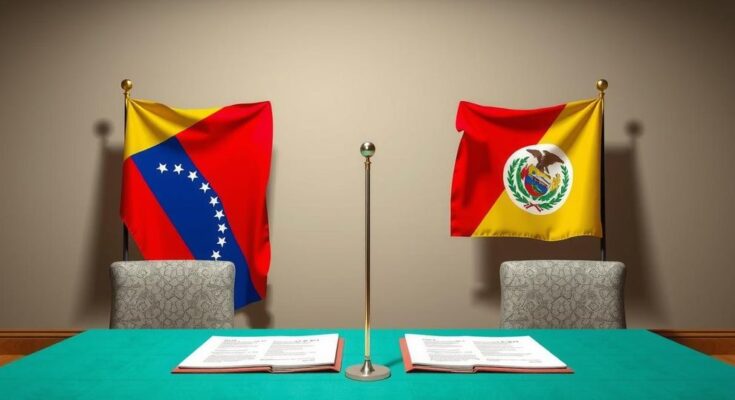A recent meeting with César Trompiz, Venezuelan Ambassador to Bolivia, highlighted the challenges and successes of Venezuela’s communes, touching on self-sustainability efforts, U.S. sanctions, and international relations, particularly with Bolivia and China. The ambassador voiced concerns about external political influences while emphasizing national resilience and solidarity efforts in the region.
On February 10, 2023, a North American delegation, organized by the Alliance for Global Justice, had the privilege to engage with César Trompiz, the Venezuelan Ambassador to Bolivia. The meeting took place in the Plaza Hugo Chávez, located within the embassy grounds, which also houses a cultural center. Ambassador Trompiz conversed with the delegation for nearly two hours, opting for an interactive discussion rather than delivering a prepared speech, allowing participants to freely inquire about various matters.
Ambassador Trompiz, a former professor specializing in governmental relations and a lifelong revolutionary, provided insights into the state of local communes in Venezuela. He explained that these communes initially thrived due to oil revenues, which supported numerous community councils and systems. However, the transition towards self-sustainability was prompted by the disruption of oil finances, leading to significant investments in social laws benefiting local fishing and farming sectors. He emphasized that while challenges persist, the commune system is experiencing a notable resurgence.
A participant posed a query about the organizations supporting small-scale farming, akin to La Vía Campesina. Trompiz acknowledged the historical dependency on oil and external technology, mentioning that the Venezuelan agricultural sector has shifted toward using local seeds instead of relying on foreign corporations like Monsanto. This change has not only stabilized agricultural production but has also dramatically increased domestic food production, with Venezuela now producing 90% of its consumption.
Concerns over recent presidential elections in Venezuela were addressed, particularly regarding criticism from notable leftist leaders such as Gustavo Petro and Lula da Silva. Trompiz expressed disappointment at their statements, attributing the inconsistency in international leftist support to their domestic political challenges. He reaffirmed Venezuela’s commitment to solidarity with regional movements despite external pressures.
The ambassador described the relationship between Venezuela and Bolivia as exceptional, referencing historical ties and mutual investments. With President Maduro’s planned visit to Bolivia, there are prospects for stronger economic collaboration, especially given Bolivia’s resource wealth.
On the topic of military threats posed by the United States, Trompiz characterized U.S. sanctions as acts of war that have led to substantial suffering in Venezuela. He noted the strategic threats, including military maneuvers and support for mercenary groups during the Trump administration. Highlighting Venezuela’s defensive capabilities, he reiterated the commitment to national sovereignty and readiness against foreign aggressions.
Venezuela’s relationship with China was another focal point of discussion, with Trompiz clarifying that China’s engagement does not impose conditions on Venezuela’s governance or military affairs. He underscored the pragmatic nature of their partnership, in contrast to the restrictions sometimes presented by U.S. and European demands.
Addressing the broader implications of recent political turmoil in Peru, Ambassador Trompiz stated that the ousting of President Pedro Castillo amounted to a coup supported by ultra-right forces. He further discussed the emigration crisis, disputing the figure of seven million Venezuelans having left, instead indicating that approximately two million fled and many are returning, aided by government initiatives.
Trompiz concluded by reflecting on geopolitical dynamics, emphasizing the United States’ ongoing expansionist tendencies and the resulting negative impacts on labor markets in both countries. He affirmed Venezuela’s resilience and commitment to navigate its challenges toward establishing a self-sustained economy.
As the meeting drew to a close, the North American delegation expressed gratitude for the ambassador’s candor and insights into the complexities surrounding Venezuela’s social, political, and economic realities, departing with a greater understanding of the nation’s current circumstances.
The discussion with Ambassador César Trompiz offered an enlightening perspective on Venezuela’s evolving socio-political landscape, marked by challenges and efforts toward self-sustainability. His insights into the impacts of U.S. sanctions, the evolution of local communes, and international relations emphasized the resilience of Venezuela amid adversity. Furthermore, the interactive format fostered openness, resulting in a richer understanding of the country’s current standing in the face of external pressures.
Original Source: www.peoplesworld.org




